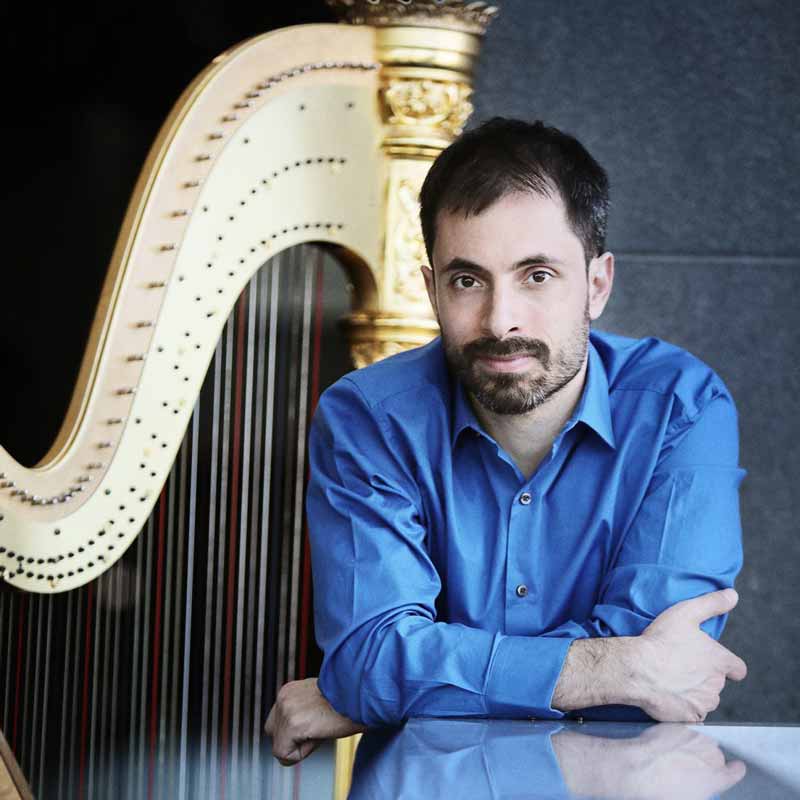by Mike Telin

Born in Jerusalem, Magen studied at the Jerusalem Academy for Music and Dance. After completing his military service, he continued his studies at the Paris Conservatory and went on to complete his Master of Music degree at the Juilliard School. Magen is the only Israeli to win the International Harp Contest in Israel. He is also the winner of the Pro Musicis International Award, and in 2012 was the winner of the Borletti-Buitoni Trust Award. Since fall 2017 he has served as principal harp of the Finnish Radio Symphony.
Mike Telin: When you were here in 2016 you brought some cutting-edge repertoire. This year feels slightly more tame.
Sivan Magen: When you play the harp you have to play Ravel’s Introduction and Allegro (June 30). And Debussy’s Sonata for Flute, Viola, and Harp (July 1) I think is one of his more sophisticated pieces. It is very beautiful but a little less accessible to the public than the cello or violin sonata, or the string quartet. It’s more of a philosophical state of mind.
We’re also doing Berio’s Folk Songs (July 2), which is a great piece, but still in that the harp keeps its role as the beautiful, resonant instrument. And Anna Thorvaldsdottir’s In the Light of Air (July 1) is the longest piece I’ll be playing. In that the harp is used very differently from the way it’s used in the other works. I’m very excited because this is the first time I have played it.
MT: I understand that you, Lucy Fitz Gibbon, and Stephen Waarts have put together a special program for the concert at The Grove on July 3.
SM: Yes! We’re doing several different kinds of things at The Grove. Stephen and I will be playing the Saint-Saëns Fantaisie which is part of the standard repertoire for violin and harp. And with Lucy we’ll do a couple of Britten’s Folk Songs which are great fun and very colorful. I’ll also play a solo piece.
MT: I’d like to go back to Debussy. I was watching your video on the Finnish Radio Orchestra website, and you said that you wish you could meet and have a chat with him. So, what would you ask him?
SM: Debussy was a fascinating man because he was such an individualist. He had strong ideas about music and he also wrote criticism — he was opinionated but he wrote in a humorous way.
Of the repertoire that was written for the harp, up until the mid-20th century, Debussy’s music is some of the most important that we have for the instrument. His music is the core of our repertoire. So for me, talking with Debussy would be gaining an understanding of the beginning of this world in which the harp was so important.
Like I said, I think he was just a fascinating man. He disliked so much of the older, mainstream German music. He had his own ideas about what French music should be, and could be. During the First World War he became almost nationalistic. So it would be fascinating to hear his ideas — just to meet that colorful person would be great.
MT: Changing topics, I noticed that the FRSO commissioned a concerto for you by Lotta Wennäkoski.
SM: Yes, and it was a lot of fun. In Finland, Lotta is one of the main composers today, and her music is being played more and more around the world. The Danish String Quartet just premiered her new quartet at Carnegie Hall a couple of months ago and her music has been played at the Proms in London.
The experience with the concerto was interesting because I have had many collaborations with composers, but this is the first time I’ve had a concerto written for me.
Composers have different attitudes on how to write for the harp. There are composers who come with their ideas, they give you the music and basically say that’s it. Or just before it is finished they ask for your feedback.
But in this case Lotta was very much writing it for me. She came to hear me play in recitals a few times and we had a lot of back and forth conversation about what the harp can do and what its limitations are in contrast with the orchestra. So there was real collaboration in the writing. Of course it is completely her music, her ideas, and her sound world. But the close collaboration was a lot of fun for me.
I hope I will get to play it a few more times. When you play a new piece for the first time you have all kinds of ideas of what could be done differently and what you can do better.
We recorded it and it will come out next season — the orchestra is recording a CD of her music.
Published on ClevelandClassical.com June 27, 2022.
Click here for a printable copy of this article


